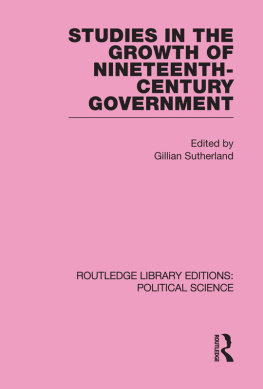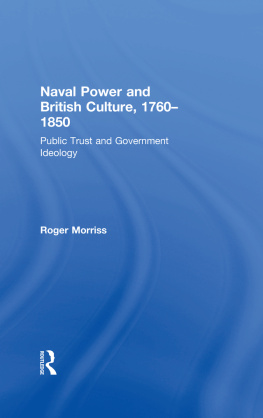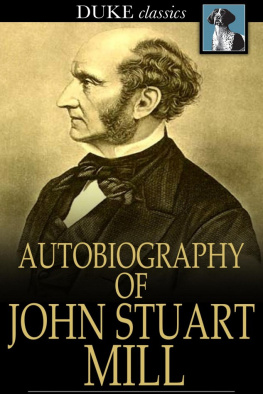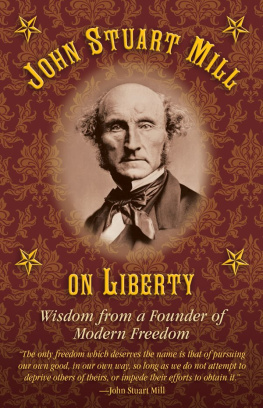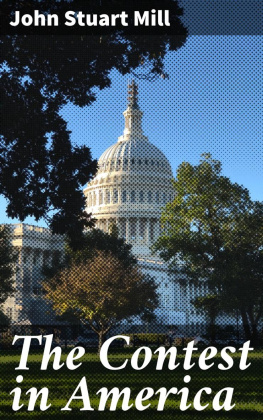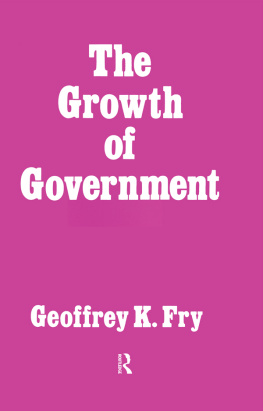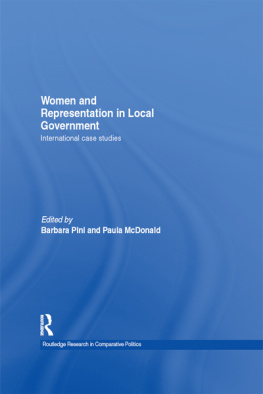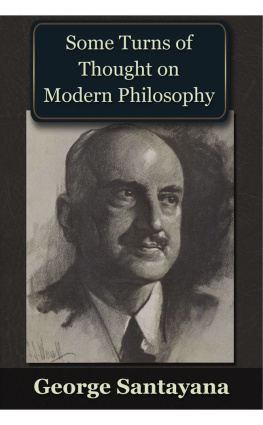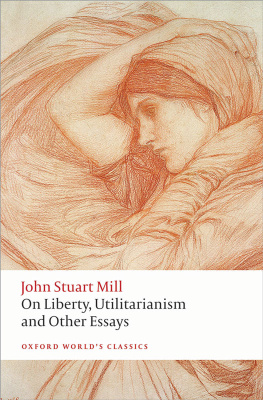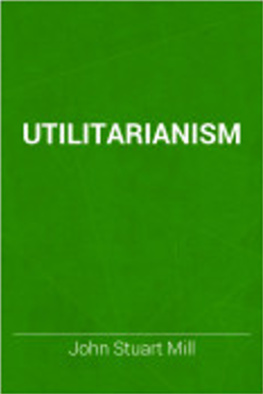ROUTLEDGE LIBRARY EDITIONS:
POLITICAL SCIENCE
STUDIES IN THE GROWTH OF NINETEENTH-CENTURY GOVERNMENT
STUDIES IN THE GROWTH OF NINETEENTH-CENTURY GOVERNMENT
Edited by
GILLIAN SUTHERLAND
Volume 33
First published 1972
This edition first published in 2010
by Routledge
2 Park Square, Milton Park, Abingdon, Oxon, OX14 4RN
Simultaneously published in the USA and Canada
by Routledge
270 Madison Avenue, New York, NY 10016
Routledge is an imprint of the Taylor & Francis Group, an informa business
1972 Routledge & Kegan Paul Ltd
All rights reserved. No part of this book may be reprinted or reproduced or utilised in any form or by any electronic, mechanical, or other means, now known or hereafter invented, including photocopying and recording, or in any information storage or retrieval system, without permission in writing from the publishers.
British Library Cataloguing in Publication Data
A catalogue record for this book is available from the British Library
ISBN 10: 0-415-49111-8 (Set)
ISBN 13: 978-0-415-49111-2 (Set)
ISBN 10: 0-415-55573-6 (Volume 33)
ISBN 13: 978-0-415-55573-9 (Volume 33)
Publishers Note
The publisher has gone to great lengths to ensure the quality of this reprint but points out that some imperfections in the original copies may be apparent.
Disclaimer
The publisher has made every effort to trace copyright holders and would welcome correspondence from those they have been unable to trace.
Studies in the growth of nineteenth - century government
edited by
Gillian Sutherland
First published 1972
by Routledge & Kegan Paul Ltd
Broadway House, 6874 Carter Lane,
London EC4V 5EL
Printed in Great Britain by
Butler & Tanner Ltd
Frome and London
Routledge & Kegan Paul Ltd 1972
No part of this book may be reproduced in
any form without permission from the
publisher, except for the quotation of brief
passages in criticism
ISBN 0 7100 7170 1
Acknowledgments
We are obliged to the Controller of Her Majestys Stationery Office for permission to make use of Crown-copyright material in the Public Record Office. For permission to make use of family papers, we are most grateful to the Earl of Clarendon, the Earl of Halifax, Earl St Aldwyn, Viscount Runciman and the Honourable Sir Steven Runciman, Lord Monk Bretton, Lord Medway, Mr W. R. Collet, Mr R. C. Hutton and Messrs A. and H. Llewellyn Smith. For permission to make use of papers deposited in their care, we are grateful to the British Library of Political and Economic Science, Cambridge University Library, Durham University Library, Manchester University Library, the National Library of Wales, the National Trust, Sheffield University Library and University College, London. We are indebted, too, to the many librarians and archivists in these and other institutions, in the Public Record Office and in the British Museum and the Bodleian Library, who have facilitated our work and given us ready assistance. Finally, we wish to record our thanks to the Past and Present Society for the support they gave to the colloquium in 1969 in which this book originated.
Abbreviations
Hansard | Hansards Parliamentary Debates |
P.P. | Parliamentary Papers |
P.R.O. | Public Record Office |
B.M. Add. MSS. | British Museum Additional Manuscripts |
Introduction | Gillian Sutherland |
In the last decade or so, interest in the development of the machinery of government in England between 1780 and 1914 has been growing, and a great deal of new work has been done.1 In the summer of 1969 it proved possible to hold a colloquium on the subject under the auspices of Past & Present. Fourteen working papers were circulated and some sixty people, including historians, political theorists and practising civil servants, spent a day in discussion of the issues raised by them.2 All but one of the essays in this collection originated either as working papers or as material introduced into the discussion. In the reflections and speculations that follow, I have drawn heavily on points and issues raised during that discussion, although my comments can in no sense be described as a report or collective statement. They are simply one persons view of the ground so far covered and the questions yet to be answered, after the stimulus of the colloquium; and their principal object is to provoke further discussion.
The one essay which did not originate either as a working paper or as material introduced into the discussion is Professor Finers The transmission of Benthamite ideas 182050. This was first delivered as a paper to the Anglo-American Historical Conference in 1959. It was not then published, as Professor Finer hoped that he would be able to follow up the hypothesis it presents with more extensive reading and to provide more extensive documentation. These hopes have been disappointed. Nevertheless, the typescript has enjoyed a considerable private circulationand was invoked and cited a number of times during our discussion. Its hypotheses focus attention on important aspects of our central concern, the complex relationships between government servants and their world. For these reasons, Professor Finer agreed to allow his paper, tentative though his hypotheses remain, to be included in this collection.
The development of the machinery of government in the first state to industrialize has an obvious interest. The central subjects of debate have been and will remain the sources of growth, in the sense of the change in direction and the expansion of government activity, and the development of formal structures and processes to sustain this. But it has become plain that this growth cannot be separated in any way from the whole social, political and intellectual context. The structure of any particular institution cannot be understood without a knowledge of the motives and circumstances which led to its creation: its workings do not make a great deal of sense without some knowledge of the policy it was expected to help formulate and implement. Thus our central concern is, as I have said, the complexities of the relationship between the government servant and his world, the interaction of his work with his social and personal life; and the very diversity of the essays in this collection is intended to point to these complexities. Some tentative generalizations, however, are possible; and some questions demand attention before work can proceed much further.
Some of the generalizations that can be offered are of a semi-methodological kind. Perhaps the most important concern the role of ideas in government growth. This has been a preoccupation since Diceys firm assertion in 1905 that his aim was to exhibit the close dependence of legislation, and even of the absence of legislation, in England during the nineteenth century, upon the varying currents of public opinion.3 But Dicey dealt in grand ideas and talked of the triumph of Benthamite ideology; and it is not too difficult to demonstrate that the views and attitudes of many government servants and, indeed, of many politicians, were neither consistent nor coherent enough to be dignified with the labels idea or ideology. However, it does not seem possible to maintain with Professor Oliver MacDonagh, at the other extreme, that the majority of government servants were wholly pragmatic, tidy-minded men, pressing towards solutions inherent in social problems, as they arose.4 It is very difficult to make sense of Kay-Shuttleworths career without reference to his Scottish education and his training and early experience as a doctor.5 Similarly, Sir John Simons commitment as a doctor surely supplied much of the dynamic of his work in public health; and one suspects that the views and sympathies which made him such a good and devoted friend of Ruskin reinforced this.6 It might be objected that these two are what Dr Parris has most appositely termed zealots,7 and cannot be considered typical; although it is perhaps worth noting that Simons biographer offers his career as a demonstration of Professor MacDonaghs self-generating bureaucratic growth. But even if one hunts for typical government servants, simple pragmatism does not explain everything. As Permanent Secretary to the Education Department 184969, R. R. W. Lingen encouraged and led a systematic retreat from policymaking of the type Kay-Shuttleworth had favoured.8 As Permanent Secretary to the Treasury 187085 he was the ferocious arch-priest of Treasury control.9 Pragmatismor the desire for a quiet lifeor meannessare not much help in explaining these attitudes. More relevant are his long friendship with Jowett, the concept of public service which they shared, and his firm belief that the local community had the primary responsibility for providing its own social services, the role of the central government being a limited, supporting one.10 Even the imperviousness of the ordinary Education Department inspector, in the years after 1870, to the pathos and poverty of the conditions in some of the schools he visited, is made more intelligible by reference to his own social background, education and motives for undertaking the work.11

